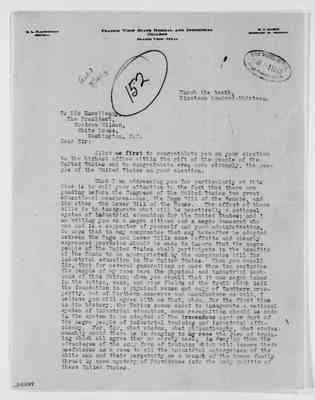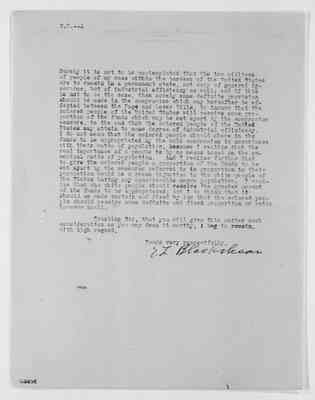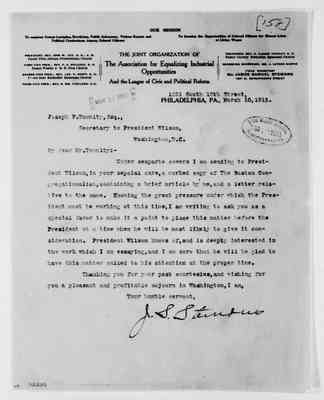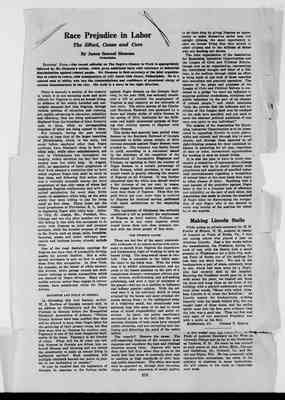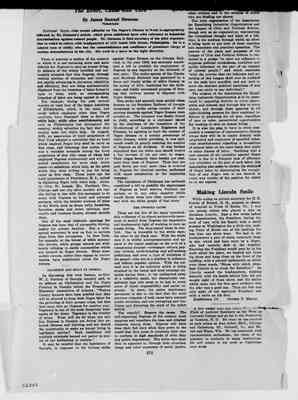Pages
711
March the tenth, Fineteen hundred-thirteen.
To His Excellency, The President, Woodrow Wilson, White House, Washington, D.C.
Dear Sir:
Allow me first to congratulate you on your election to the highest office within the gift of the people of the United States and to congratulate even more strongly, the people of the United States on your election.
What I am addressing you for particularly at this time is to call your attention to the fact that there are pending before the Congress of the United States two great educational measures---one, the Page Bill of the Senate, and the other, the Lever Bill of the House. The effect of these bills is to inaugurate what will be practically a national system of industrial education for the United States; and I am writing you as a negro citizen and a negro democrat who was and is a supporter of yourself and your administration, to urge that in any compromise that may hereafter be adopted between the Page and Lever Bills some definite and clearly expressed provision should be made to insure that the negro people of the United States shall participate in the benefits of the funds to be appropriated by the compromise bill for industrial education in the United States. When you recall, Sir, that for several generations or more than two centuries the people of my race were the physical and industrial backbone of this Nation; when you recall that it was negro labor in the cotton, cane, and rice fields of the South which laid the foundation in a physical sense not only of Southern prosperity but of Northern conmerce and manufacture as well, I believe you will agree with me that, when, for the first time in its history, the Nation seems about to inaugurate a national system of industrial education, some recognition should be made in the system to be adopted of the tremendous need on part of the negro people of industrial training and industrial efficiency. For, Sir, what wisdom, what philanthrophy, what statesmanship could there be in denying to my race the form of training which all agree they so sorely need; in denying them the advantages of the only form of training which will insure their usefulness as a race to all the industrial enterprises of the white man and their perpetuity as a branch of the human family thrust by some mystery of Providence into the body politic of these United States.
83397
712
W. W.--2
Surely it is not to be contemplated that the ten millions of people of my race within the borders of the United States are to remain in a permanent state, not only of general ignorance but of industrial efficiency as well; and if this is not to be the case, then surely some definite provision should be made in the compromise which may hereafter be effected between the Page and Lever Bills, to insure that the colored people of the United States will receive some proportion of the funds which may be set apart by the compromise measure, to the end that the colored people of the United States may attain to some degree of industrial efficiency. I do not mean that the colored people should share in the funds to be appropriated by the said compromise in accordance with their ratio of population, because I realize that the real importance of a people is by no means based on the numerical ratio of population. And I realize further that to give the colored people a proportion of the funds to be set apart by the measures referred to in proportion to their population would be a gross injustice to the white people of the States having any considerable negro population. I realize that the white people should receive the greater amount of the funds to be appropriated; but I do think that it should be made certain and fixed by law that the colored people should receive some definite and fixed proportion or ratio however small.
Trusting Sir, that you will give this matter such consideration as you may deem it worthy, I beg to remain, with high regard,
Yours very respectfully, E.L. Blackshear
83396
713
1251 South 18th Street March 10, 1913.
Joseph P. Tumulty, Esq., Secretary to President Wilson, Washington, D.C.
My dear Mr. Tumulty:-
Under seaparte covers I am sending to President Wilson, in your sepcial care, a marked copy of The Boston Congregationalist, containing a brief article by me, and a letter relative to the same. Knowing the great pressure under which the President must be working at this time, I am writing to ask you as a special favor to make it a point to place this matter before the President at a time when he will be most likely to give it consideration. President Wilson knows of, and is deeply interested in the work which I am essaying, and I am sure that he will be glad to have this matter called to his attention at the proper time.
Thanking you for your past courtesies, and wishing for you a pleasant and profitable sojourn in Vashington, I am,
Your humble servant,
J. S. Stemons
714
Race Prejudice in Labor The Effect, Cause and Cure
by James Samuel Stemons Philadelphia
EDITORS' NOTE.—Our recent editorial on The Negro's Chance to Work is appropriately followed by Mr. Stemons's article, which gives additional facts with reference to industrial discrimination against colored people. Mr. Stemons is field secretary of the joint organization to which he refers, with headquarters at 1251 South 18th Street, Philadelphia. He is a colored man of ability who has the commendations and confidence of prominent clergy of various denominations in his city. His work is a move in the right direction.
There is scarcely a section of the country in which it is not becoming more and more difficult for Negroes to earn an honest living. In defiances of the widely heralded and universally accepted fact that Negroes, through various systems of education and training, are rapidly advancing in character, reliability and efficiency, they are being systematically displaced from the branches of labor formerly open to them, while no corresponding branches of labor are being opened to them.
For example, during the past several months at least four of the larger hostelries of Philadelphia, which, in the main, had never before employed other than Negro servitors, have dismissed them in favor of white help; while other establishments, not only in Philadelphia but throughout the country, widely advertise the fact that they employ none but white help. In August, 1911, an association of hotel proprietors of New York adopted a resolution that no hotel which employs Negro help shall be rated as first class, and following that action there was a veritable scramble among the hotel proprietors of that city -- some of whom had employed Negroes continuously and with admitted satisfaction for more than thirty years -- to substitute white help, as the price which they were willing to pay for being rated as first class. Thre years ago the hotel proprietors of Providence, R. I., united in displacing Negro with white help. Atlantic City, St. Joseph, Mo., Portland, Ore., Chicago and one city after another are rapidly falling in line with this movement to do away with Negroes as hotel and personal servants, while the broader avenues of labor in the North, such as shops, mills, foundries, factories, steam and street railways, mercantile and business houses, already exclude them.
One of the most desirable openings for Negroes has been that of automobile driving, mostly for private families. But a widespread movement is now on foot to exclude them from this occupation. In New York, for example, at the behest of white automobile drivers, white garage owners are stubbornly refusing to stable automobiles which are manned by Negro drivers. Many automobile owners, rather than engage in controversies, have substituted white for Negro drivers.
INJUSTICE AND FOLLY IN GEORGIA
In discussing this very feature, ex-Gov. W. J. Northen of Georgia recently said, in an address on Christianity and the Negro Problem in Georgia before the Evangelical Ministers' Association of Atlanta: "Walton County farmers have been notified that they wil be allowed to keep their Negro labor for the gathering of their present crops, but that they must hire no Negroes for another year. Vagrancy is one of the most dangerous tendencies of the times. Vagrancy is the breeder of crime. What will we do when one million Negroes in Georgia are driven into enforced idleness and loitering and are denied the opportunity to make an honest living in legitimate service? Such conditions will multiply criminals beyond our power to punish or our inclination to reclaim."
It may be recalled that the legislature of Georgia, in response to the furious strike against Negro firemen on the Georgia Railroad, in the year 1908, has seriously considered a bill to prohibit the employment of Negroes in any capacity on the railroads of that state. The entire system of the Cincinnati Southern Railroad was paralyzed by a fierce and bloody strike of white firemen in the spring of 1911, instituted for the deliberate and boldly announced purpose of forcing that railway system to dispense with Negro firemen.
This strike had scarcely been settled when firemen on the Southern Railroad of Georgia threatened to strike unless certain of their extreme demands against Negro firemen were acceded to. The company was finally forced to yield, according to a statement issued by the chairman of the committee of the Brotherhood of the Locomotive Engineers and Firemen, by agreeing to limit the number of Negro firemen to a certain percentage of white firemen, which provision, it was said, would result in greatly reducing the number of Negroes on all divisions. It was further stipulated that the white men should receive a flat increase of ten per cent. in wages. Their wages formerly were twenty per cent. more than those of Negroes. Thus they are paid thirty per cent. more than is received by Negroes for identical service, performed with equal satisfaction to the employing company.
The legislature of Oklahoma has seriously considered a bill to prohibit the employment of Negroes as hotel waiters, Pullman car poreters, or in any other capacity which would throw them into close personal contact with the white people of that state.
THE TWOFOLD CAUSE
These are but few of the many unmistakable evidences of an almost nation-wide movement to snatch from Negroes the imperative and fundamental right of working to earn an honest living. The deep-seated cause is two-fold. One is traceable to the white race: the other to the black race. With the white race it is the willful misrepresentation and the appeals to the basest passions on the part of a conspicuous element -- newspaper editors, popular writers, strife-breeding and self-seeking politicians, and even a type of ministers of the gospel -- who are in a position to influence and inflame popular opinion. With the colored race it is the notoriety which is being attained by the basest and the most criminal elements among them; to the undisputed sway of a relatively small, but obnoxiously conspicuous type who seem to be lost to every sense of moral responsibility and social restraint. In short, the entire reactionary movement is due to the fact that the most perverse elements of both races have usurped public attention, and are corrupting and confusing and distorting the mind of the entire nation.
The remedy? Remove the cause. The self-respecting Negroes of the country must suppress and repudiate the base and criminal elements among them. Negroes will have done their full duty when they prove to the world that they mean to constrain their race to conform to high standards of civic duty and public deportment. The white race must then be appealed to, through their churches, clergy and other exponents of social justice, to do their duty by giving Negroes an opportunity to make themselves useful men and upright citizens, the same opportunity to earn an honest living they they extend to other citizens and to the millions of aliens who are flooding our shores.
The joint organization of the Association for Equalizing Industrial Opportunities and the League of Civic and Political Reform, though new as an organization, representing the crystallized thought and labor of a lifetime, is the medium through which an effort is being made to put both of these remedies into immediate and practical operation. The essence of the plans and purposes of the League of Civic and Political Reform is contained in a pledge "to exert my influence to supress political crookedness, rowdyism and public indecency on the part of an element of colored people;" and which concludes "with the proviso that the influence and activities of this League shall ever be confined to the ends here specified, and not used to serve the abstract politicial ambitions of any race, any party or any individual."
The mission of the Association for Equalizing Industrial Opportunities is to be prosecuted by appealing directly to every pastor, white and colored, and through him to every church, and through these agencies to all right-thinking persons for their combined influence in procuring for all men, regardless of race or color, unrestricted opportunities for working to earn an honest living.
It is also the plan to have in every community a committee of representative citizens whose duty will be to confer directly with proprietors and employers of specified industrial establishments regarding a recognition of colored labor on the same bases that apply to other classes of labor. Realizing that a vast amount of the prejudice against Negro labor is due to a frequent lack of efficiency and reliability on the part of such labor, this Association also seeks to elevate the standard of Negro labor by discouraging the recognition of any Negro who is not deemed in every way worthy of the position for which he or she aspires.
715
The Effect, Cause and Cure
By James Samuel Stemons Philadelphia
EDITORS' NOTE.—Our recent editorial on the Negro's Chance to Work is appropriately followed by Mr. Stemons's article, which gives additional facts with reference to industrial discrimination against colored people. Mr. Stemons is field secretary of the joint organization to which he refers, with headquarters at 1251 South 18th Street, Philadelphia. He is a colored man of ability who has the commendations and confidence of prominent clergy of various denominations in his city. His work is a move in the right direction.
[COLUMN 1]
There is scarcely a section of the country in which it is not becoming more and more difficult for Negroes to earn an honest living. In defiance of the widely heralded and universally accepted fact that Negroes, through various systems of education and training, are rapidly advancing in character, reliability and efficiency, they are being systematically displaced from the branches of labor formerly open to them, while no corresponding branches of labor are being opened to them.
For example, during the past several months at least four of the larger hostelries of Philadelphia, which, in the main, had never before employed other than Negro servitors, have dismissed them in favor of white help; while other establishments, not only in Philadelphia but throughout the country, widely advertise the fact that they employ none but white help. In August, 1911, an association of hotel proprietors of New York adopted a resolution that no hotel which employs Negro help shall be rated as first class, and following that action there was a veritable scramble among the hotel proprietors of that city—some of whom had employed Negroes continuously and with admitted satisfaction for more than thirty years—to substitute white help, as the price which they were willing to pay for being rated as first class. Three years ago the hotel proprietors of Providence, R. I., united in displacing Negro with white help. Atlantic City, St. Joseph, Mo., Portland, Ore., Chicago and one city after another are rapidly falling in line with this movement to do away with Negroes as hotel and personal servants, while the broader avenues of labor in the North, such as shops, mills, foundries, factories, steam and street railways, mercantile and business houses, already exclude them.
One of the most desirable openings for Negroes has been that of automobile driving, mostly for private families. But a widespread movement is now on foot to exclude them from this occupation. In New York, for example, at the behest of white automobile drivers, white garage owners are stubbornly refusing to stable automobiles which are manned by Negro drivers. Many automobile owners, rather than engage in controversies, have substituted white for Negro drivers.
INJUSTICE AND FOLLY IN GEORGIA
In discussing this very feature, ex-Gov. W. J. Northen of Georgia recently said, in an address on Christianity and the Negro Problem in Georgia before the Evangelical Ministers' Association of Atlanta: "Walton County farmers have been notified that they will be allowed to keep their Negro labor for the gathering of their present crops, but that they must hire no Negroes for another year. Vagrancy is one of the most dangerous tendencies of the times. Vagrancy is the breeder of crime. What will we do when one million Negroes in Georgia are driven into enforced idleness and loitering and are denied the opportunity to make an honest living in legitimate service? Such conditions will multiply criminals beyond our power to punish or our inclination to reclaim."
It may be recalled that the legislature of Georgia, in response to the furious strike
[COLUMN 2]
against Negro firemen on the Georgia Railroad, in the year 1908, has seriously considered a bill to prohibit the employment of Negroes in any capacity on the railroads of that state. The entire system of the Cincinnati Southern Railroad was paralyzed by a fierce and bloody strike of white firemen in the spring of 1911, instituted for the deliberate and boldly announced purpose of forcing that railway system to dispense with Negro firemen.
This strike had scarcely been settled when firemen on the Southern Railroad of Georgia threatened to strike unless certain of their extreme demands against Negro firemen were acceded to. The company was finally forced to yield, according to a statement issued by the chairman of the committee of the Brotherhood of Locomotive Engineers and Firemen, by agreeing to limit the number of Negro firemen to a certain percentage of white firemen, which provision, it was said, would result in greatly reducing the number of Negroes on all divisions. It was further stipulated that the white men should receive a flat increase of ten per cent. in wages. Their wages formerly were twenty per cent. more than those of Negroes. Thus they are paid thirty per cent. more than is received by Negroes for identical service, performed with equal satisfaction to the employing company.
The legislature of Oklahoma has seriously considered a bill to prohibit the employment of Negroes as hotel waiters, Pullman car porters, or in any other capacity which would throw them into close personal contact with the white people of that state.
THE TWOFOLD CAUSE
These are but few of the many unmistakable evidences of an almost nation-wide movement to snatch from Negroes the imperative and fundamental right of working to earn an honest living. The deep-seated cause is twofold. One is traceable to the white race; the other to the black race. With the white race it is willful misrepresentation and appeals to the basest passions on the part of a conspicuous element—newspaper editors, popular writers, strife-breeding and self-seeking politicians, and even a type of ministers of the gospel—who are in a position to influence and inflame popular opinion. With the colored race it is the notoriety which is being attained by the basest and most criminal elements among them; to the undisputed sway of a relatively small, but obnoxiously conspicuous type who seem to be lost to every sense of moral responsibility and social restraint. In short, the entire reactionary movement is due to the fact that the most perverse elements of both races have usurped public attention, and are corrupting and confusing and distorting the mind of the entire nation.
The remedy? Remove the cause. The self-respecting Negroes of the country must suppress and repudiate the base and criminal elements among them. Negroes will have done their full duty when they prove to the world that they mean to constrain their race to conform to high standards of civic duty and public deportment. The white race must then be appealed to, through their churches, clergy, and other exponents of social justice,
[COLUMN 3]
other citizens and to the millions of aliens who are flooding our shores.
The joint organization of the Association for Equalizing Industrial Opportunities and the League of Civic and Political Reform, though new as an organization, representing the crystallized thought and labor of a lifetime, is the medium through which an effort is being made to put both of these remedies into immediate and practical operation. The essence of the plans and purposes of the League of Civic and Political Reform is contained in a pledge "to exert my influence to suppress political crookedness, rowdyism and public indecency on the part of an element of colored people;" and which concludes "with the proviso that the influence and activities of this League shall ever be confined to the ends here specified, and not be used to serve the abstract political ambitions of any race, any party or any individual."
The mission of the Association for Equalizing Industrial Opportunities is to be prosecuted by appealing directly to every pastor, white and colored, and through him to every church, and through these agencies to all right-thinking persons for their combined influence in procuring for all men, regardless of race or color, unrestriced opportunities for working to earn an honest living.
It is also the plan to have in every community a committee of representative citizens whose duty will be to confer directly with proprietors and employers of specified industrial establishments regarding a recognition of colored labor on the same bases that apply to other classes of labor. Realizing that a vast amount of the prejudice against Negro labor is due to a frequent lack of efficiency and reliability on the part of such labor, this Association also seeks to elevate the standard of Negro labor by discouraging the recognition of any Negro who is not deemed in every way worty of the position for which he or she aspires.
Making Lincoln Smile
While acting as private secretary for H. B. Fowler of Bristol, N. H., surgeon in charge of hospital at Point of Rocks, Va., I was one among others who played a joke on Abraham Lincoln. Just a few weeks before the assassination, the President, feeling the need of rest, with his family took a small steamer at Washington for a little trip, making Point of Rocks one of his landings for less than one short hour. We had in the headquarters a pair of shoes, extremely large in size, which had been worn by a Negro, who had recently died in the hospital. Knowing the President would pass by in his walk about the place, we hustled out those big shoes and hung them on the front of the building, with a placard underneath on which were these words, "Shoes with which Abraham Lincoln is to crush the Rebellion." As Lincoln neared the headquarters, walking leisurely with his hands behind him, his eye caught sight of those shoes, and the smiles which came into his face gave evidence that the joke was a good one. Thus my first and only sight of our martyred President was with a smile on his face.
Middletown, Ct. GEORGE T. MEECH.
A five weeks' tour has taken [illegible] Fitch of Andover Seminary as far West as Colorado College and as far to the Northwest as Yankton, N. D. En route he has touched at such points as Ann Arbor, Mich., Chicago and Galesburg, Ill., Grinnell, Io., and Beloit and Ripon, Wis. He has presented, with characteristic enthusiasm, the claim of the ministry to students in many institutions. He will return to his work at Cambridge next week.
272
83399
